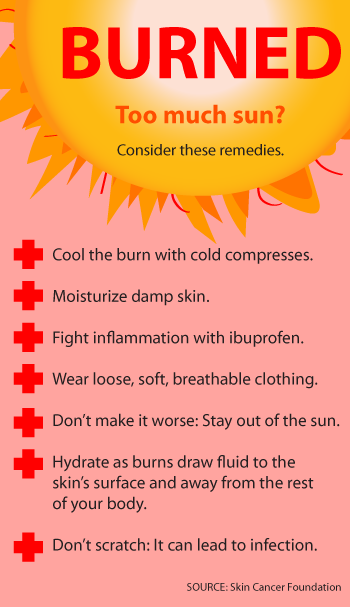
You did it again … stayed out in the sun and forgot to take the necessary precautions, and now you are feeling the burn – red, painful skin that feels hot to the touch.
Sunburns can appear hours after excessive UV exposure and take several days to fade. Repeated and intense sun exposure increases your risk of skin damage and diseases including wrinkles, dark spots and skin cancers, according to Mayo Clinic.
Experts advise being diligent about taking precautions in the sun to protect yourself and your family. According to Cancer Research UK, getting a painful sunburn just once every two years can triple your risk of melanoma skin cancer. And, a sunburn doesn’t have to be raw, peeling or blistering to count. If your skin has gone pink or red in the sun, that’s a sunburn.
Protect yourself:
- Wearing plenty of sunscreen: Keep in mind what you plan to do such as swimming and sweating and remember to re-apply often.
- Burned where? Don’t forget that you can get burned in odd places such as your earlobes and between your toes.
- Wear a hat and sunglasses.
- Consider a cover-up to limit your amount of UV exposure.
- Be aware of what time it is as peak hours for sun exposure are from 10 a.m. to 3 p.m.
If you are already looking lobster-ish and past the point of preventative measures, consider these remedies from the Skin Cancer Foundation:
- Cool it down: Cool the burn with cold compresses or quick cool showers or baths but don’t apply ice directly to a sunburn. Avoid harsh soap that could irritate your skin even more.
- Moisturize while skin Is damp: While your skin is damp, use a gentle moisturizing lotion (not petroleum or oil-based ointment that may trap the heat). Repeat over the next few days. Aloe vera may also soothe mild burns and is generally considered safe.
- Decrease the inflammation: Take ibuprofen, naproxen or aspirin to help with discomfort and inflammation.
- Be loose: Wear loose, soft, breathable clothing to avoid further skin irritation.
- You’ve learned your lesson: Stay out of the sun.
- Replenish your fluids: Hydrate as burns draw fluid to the skin’s surface and away from the rest of the body.
- Don’t scratch: Scratching or popping blisters can lead to infection. Signs of infection include red streaks or oozing.
- See a doctor: See a doctor if you have severe blistering over a large portion of your body, have a fever and chills or are woozy or confused.
In general, being diligent about protecting your skin from the sun is the best medicine, according to doctors.
